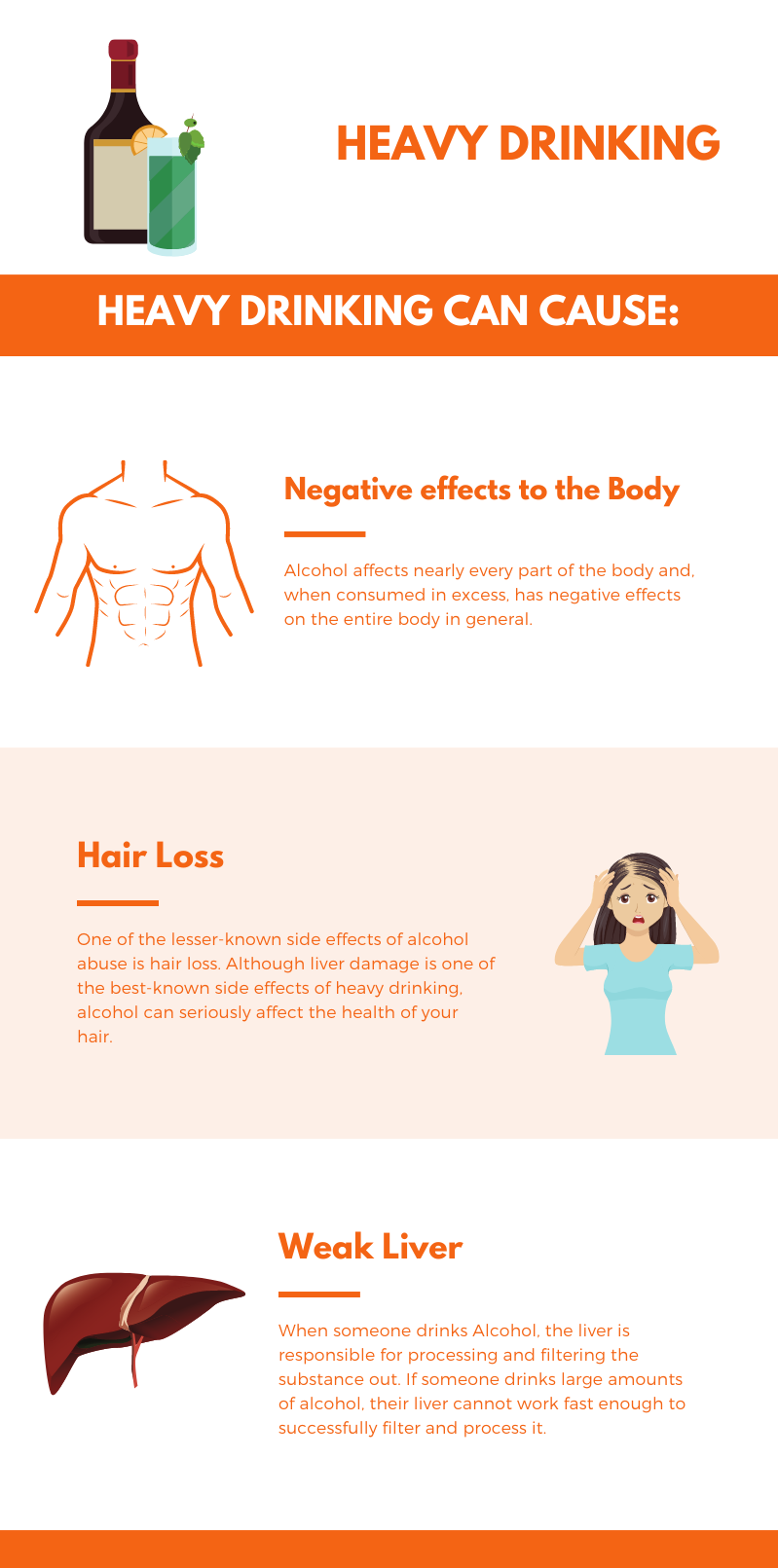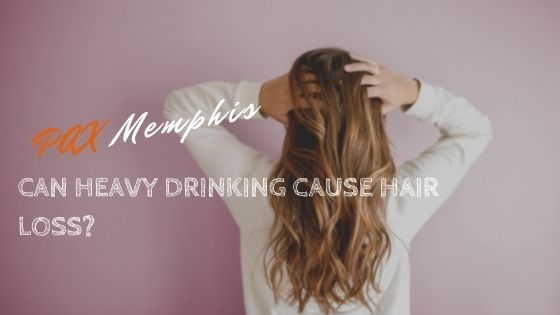Alcohol affects nearly every part of the body and, when consumed in excess, has negative effects on the entire body in general. One of the lesser-known side effects of alcohol abuse is hair loss. Although liver damage is one of the best-known side effects of heavy drinking, alcohol can seriously affect the health of your hair.
Drinking alcohol may cause hair loss for a variety of different reasons, ranging from hormonal changes to poor nutrition. Although it is normal to shed up to 100 hair a day, losing more than this is a red flag that something is wrong with your health. If you’re a heavy drinker, you could be experiencing the toxic relationship between alcohol and hair loss.
That being said, there are multiple different types of hair loss. People who drink in moderation and are experiencing hair loss or hair thinning probably don’t need to place the blame on the booze. However, if you are a heavy drinker or an alcoholic, chronic drinking may lead to health issues like nutritional deficiencies that ultimately lead to hair loss. At the same time, there are other lifestyle factors that increase a person’s risk of losing hair, such as drug abuse or tobacco use.

The Relationship Between Alcohol and Hair Loss
Virtually no part of the body is left unharmed by the long-term effects of alcohol abuse and alcoholic drinking. Moreover, there are several ways that hair loss can be triggered by the effects of alcohol. Let’s take a deeper look into how heavy alcohol use causes hair loss.
Malnutrition
Heavy drinking is associated with the malabsorption of key nutrients in the body, such as zinc, copper, and protein. When the body fails to absorb these key nutrients, it begins to suffer from malnutrition. Similarly, some people who abuse alcohol simply don’t eat enough food or consume a poor diet that lacks the nutrients the body needs. In other cases, chronic drinking damages the stomach lining, increases acid production in the digestive system, and makes it nearly impossible for the body to absorb these nutrients properly. As a result, malnutrition is one of the most common health conditions among people with alcohol use disorder. Moreover, iron, zinc, copper, and protein deficiencies are all tied to hair loss and hair thinning.[1]
Dehydration
Alcohol is a diuretic, so it makes people urinate more frequently. As a result, it also dehydrates the body very quickly. While dehydration is the primary cause of hangovers the next morning, a lack of hydration also affects the strength and elasticity of the skin. Chronic drinking may ultimately promote dry skin, itching, and a damaged scalp – all factors that may harm hair follicles and result in brittle hair, hair loss, or hair thinning.[2] In fact, dehydration is one of the key factors in achieving healthy hair.
Poor Sleep Quality
Many people believe that because alcohol makes them drowsy, it leads to better sleep. Although it may help you fall asleep faster, it is more than likely that you are experiencing disruptive or low-quality sleep when abusing alcohol. When the body and mind don’t get enough quality, restorative sleep, it increases stress levels and levels of cortisol in the body.
One stress-related condition that commonly affects alcoholics is telogen effluvium (TE), also known as stress-induced hair loss. Additionally, high levels of stress are also linked to reduced oxygen intake, which further dehydrates and reduces hair health.[3] As a result of stress-induced hair loss, the hair follicles fail to replenish themselves as they normally word, leading to increased shedding and thinning.
Hormonal Changes
Another way in which drinking alcohol and hair loss are related is through hormonal changes. Drinking too much over an extended period of time can lead to a spike in estrogen levels. Estrogen is a female sex hormone that is the equivalent of testosterone for men. However, multiple studies have linked chronic alcohol consumption with increased levels of estrogen, a condition that could contribute to hair loss and hair thinning in the body. Although this is commonly seen during perimenopause and menopause, high estrogen levels in heavy drinkers may ultimately trigger shedding hair.[4]
Blood Sugar Spikes
Many alcoholic beverages contain a lot of sugar and ingredients that lead to blood sugar spikes or, in the long term, insulin resistance. While this is not only a contributing factor to alcoholic diabetes, it can also have a spike of insulin and androgens – chemicals that bind to hair follicles and encourage hair to fall out. As a result, blood sugar spikes caused by alcohol abuse is linked to pattern baldness and hair loss.[5]
Tips on Avoiding Hair Loss Due to Alcohol
The best way to avoid losing hair from chronic drinking is to cut back on the amount you drink or stop drinking altogether. If possible, people should keep their alcohol consumption at moderate levels. This refers to having one drink per day for women and two drinks per day for men – or less. However, alcohol is still a toxic substance, so there is no 100% safe way to consume it.
Moreover, many people who are experiencing hair loss due to alcohol are doing so because they have abused alcohol for many years and are likely addicted. In this case, it is best to seek professional treatment from an alcohol rehab near you.
Once you have either cut back on your drinking or sought help for a drinking problem, there are other lifestyle choices you can make to support better overall health and stimulate new, healthy hair growth, such as:
- Stay hydrated – drinking plenty of water will help your body and bodily systems function properly, resulting in healthier hair, skin, and nails.
- Eat a balanced diet – focus on eating fresh fruits and vegetables, lean proteins, and nutrients. Consult with your doctor or nutritionist about any nutritional needs or deficiencies.
- Quit smoking tobacco – smoking is another factor that leads to malnutrition and malabsorption of nutrients and can contribute to hair loss.
- Speak with your doctor – make sure you consult with your doctor about both your alcohol abuse and hair loss to gain access to the best treatment plan for your needs.
Get Help With Alcohol Abuse Today
For some people, quitting or cutting back on drinking isn’t that easy. If you find yourself wanting to cut back but not being able to, you may have a drinking problem. Whether you’re simply looking to get healthier and get your drinking under control or you have battled alcoholism for years and aren’t sure of where to turn, our dedicated addiction treatment specialists in Memphis are here to help.
With a team of certified addiction therapists and expert doctors, we’ll help you with all of your alcohol and hair loss related needs. Contact us today to learn more about your alcohol treatment options.
References:
- https://www.ncbi.nlm.nih.gov/pmc/articles/PMC5315033/
- https://www.hairclub.com/blog/dehydration-and-hair-loss/
- https://www.mayoclinic.org/healthy-lifestyle/stress-management/expert-answers/stress-and-hair-loss/
- https://www.compoundingexpert.com/root-cause-of-womens-hair-loss/
- https://www.today.com/style/foods-eat-avoid-healthy-shiny-hair-t5811
Medically Reviewed: September 25, 2019

All of the information on this page has been reviewed and verified by a certified addiction professional.










